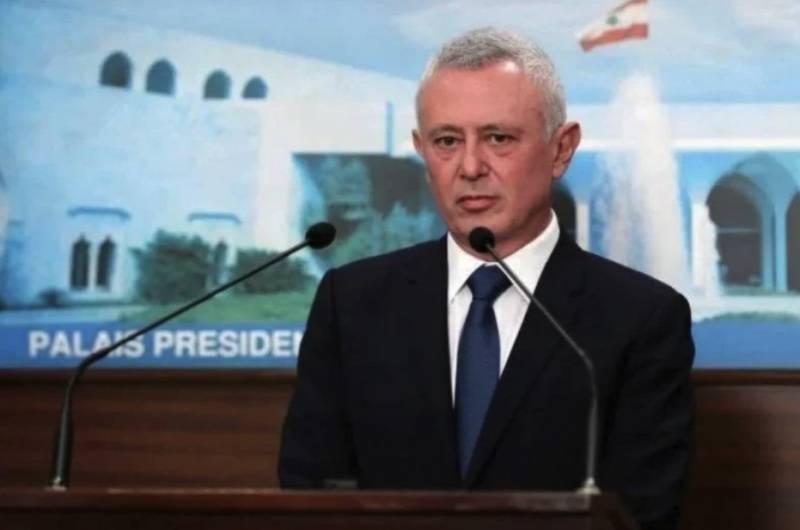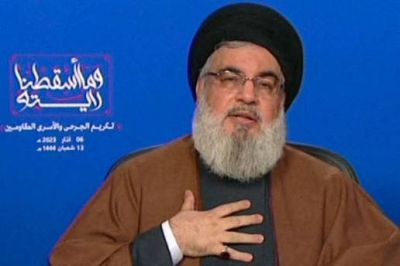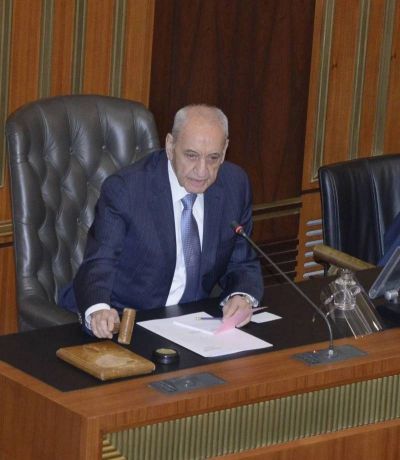
Marada Movement leader Sleiman Frangieh speaks from the Presidential Palace in Baabda on Jan. 11, 2022. (Credit: Dalati and Nohra)
Could Hezbollah and the Amal Movement count on Sunni MPs to propel Sleiman Frangieh to the presidency?
With Parliament Speaker Nabih Berri and Hezbollah Secretary-General Hassan Nasrallah officially endorsing Frangieh for the presidency, the support of the majority of the Sunni MPs (27 members) is essential to secure the necessary 65 votes for the Marada Movement leader to advance to the second round of the election.
This is particularly true since the two Shiite parties cannot rely on the support of Free Patriotic Movement leader Gebran Bassil, who is at odds with Hezbollah and refuses to endorse his rival’s candidacy.
Bassil’s opposition raises the possibility of a lack of quorum and threatens to prevent Frangieh’s election.
Hezbollah, however, can manage to sway the vote in Frangieh’s favor, by capitalizing on internal divisions among Sunni MPs, in the absence of any strong, centralized Sunni leadership since former Prime Minister Saad Hariri’s withdrawal from politics over a year ago.
This is the strategy that Hezbollah successfully employed last June, securing Berri’s election at the head of the legislature with 65 votes, without Bassil’s explicit support, relying on some votes from the [FPM’s] Strong Lebanon Bloc and several Sunni votes.
However, should Saudi Arabia, the Sunni power in the region, reject Frangieh’s candidacy, it could pose a significant obstacle to Hezbollah’s efforts this time around.
Eleven uncertain votes
Out of the 27 seats designated for the Sunni community in Parliament, nine are held by independents who support the March 8 camp and should have no issue voting for Frangieh.
For example, Tripoli MP Faisal Karameh, is well aligned with his Zgharta neighbor Frangieh.
Meanwhile, seven MPs are openly opposed to Hezbollah and the current government, so it is unlikely they will support Frangieh’s candidacy.
But between these two camps, there are 11 MPs who were formerly affiliated with Hariri, and there are others who have independent “centrist” political orientations.
Hezbollah and Amal are counting on this neutral group, among other factors, to secure the 65 votes required to elect Frangieh in the second round — a task that does not seem impossible.
A few weeks ago, caretaker Prime Minister Najib Mikati stated that Sunni MPs could support the Marada leader when the time is right.
“We do not have a veto on Frangieh,” Abdul Rahman Bizri, an independent Sunni MP from Saida, who was one of the pioneers of the “centrist” strategy in the presidential election, told L’Orient-Le Jour.
Due to the lack of a centralized Sunni leadership, these MPs are significantly weakened and refrain from taking sides to avoid being on the losing end. Despite courting the opposition for a long time, they refused to vote for the pro-opposition presidential candidate, MP Michel Moawad.
In the 11 parliamentary sessions held to elect a president so far, most of the Sunni MPs voted for the “New Lebanon.”
By doing so, they aimed to distance themselves from both the opposition and the Hezbollah camps (which voted blank) and avoid being part of any political polarization.
They also appear to want to support any compromise deal once it is underway, with the hope that their conciliatory approach would be recognized and rewarded with a position in the Grand Serail.
‘If Saudi Arabia names its favorite’
The MPs formerly affiliated with Hariri’s party are taking an even more conciliatory stance.
“If a consensus is reached on Frangieh’s candidacy, the National Moderation bloc will not oppose it,” said Sagih Attieh, a Greek Orthodox MP from Akkar, whose predominantly Sunni parliamentary bloc includes former Hariri MPs from the North.
“If an election session were held with the required quorum and Sleiman Frangieh could obtain 65 votes, we could vote for him to end the presidential vacuum,” he told L’Orient-Le Jour.
Many observers believe that the former Hariri loyalists see Frangieh’s election as a possible path for Hariri to return to the political stage.
Hariri and Frangieh share a relatively close relationship. The Future Movement head supported Frangieh’s presidential candidacy in 2016 before ultimately endorsing former President Michel Aoun as a compromise candidate.
However, Hariri’s comeback is mainly dependent on external factors, including a green light from Saudi Arabia, which has traditionally been the guardian of Lebanon’s Sunni community.
The Saudi kingdom does not appear to be in a rush to support Hariri’s return to a leadership position among the Sunnis, nor does it want to see Frangieh, or any other candidate aligned with Hezbollah, become president.
Saudi Ambassador to Lebanon Waleed Bukhari’s recent tweet confirms this sentiment.
“Two silent [letters] cannot follow each other,” he wrote, referencing an Arabic grammatical rule that the “failing silent sound” must be eliminated.
The tweet was published immediately after Nasrallah’s speech, and it was widely seen as a veiled reference to Frangieh.
Sunni MPs may now be cautious about their political ambitions for fear of being alienated by Riyadh and suffering the same fate as Hariri.
“If Saudi Arabia vetoes Franigeh’s candidacy, of course, we will not support him,” Attieh said. “And if the Saudis name their preferred candidate, we will surely back him.”
He went on to say, “But for the moment, the kingdom maintains an ambiguous position and refrains from openly expressing a preference. Faced with this reality, what can we do? Leave the country without a president or support a compromise?”
Nabil Badre, MP for Beirut II, seems to concur.
“Without the support of Arab countries, Lebanon will not be able to get out of the crisis,” Badre told L’Orient-Le Jour. “We, therefore, refuse to persevere in the policy of enmity with these countries, especially Saudi Arabia, by supporting a president that Riyadh refuses.”
“But eventually, we will make the decision together within the moderate bloc,” he added.
This article was originally published in French by L'Orient-Le Jour. Translation by Sahar Ghoussoub.

